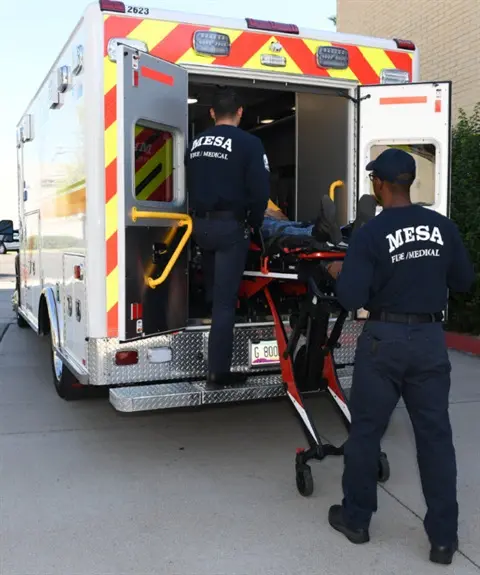Becoming a first responder is a rewarding and essential career path. Whether as an Emergency Medical Technician (EMT), Paramedic, or in another first responder role, these professionals are often the first point of contact during medical emergencies. Their ability to provide immediate and effective care can make all the difference in saving lives.
For those eager to embark on this life-changing journey, it’s important to understand the core elements of medical education that will provide the foundation for success. In this blog, we’ll explore the key components of medical education for aspiring first responders and how they prepare you for the challenges that lie ahead.
Image courtesy of Mesa Fire & Medical Department.
Understanding the Role of a First Responder
The role of a first responder is multifaceted and crucial to the healthcare system. First responders are tasked with assessing emergency situations, providing life-saving interventions, and stabilizing patients before transporting them to a medical facility.
For anyone entering the field, understanding the complexity of this role is essential. It goes beyond simply administering care it involves making critical decisions under pressure, staying calm in high-stress environments, and working seamlessly with other emergency services. As you pursue your training, you’ll learn how to prioritize care, assess medical emergencies, and respond to situations with confidence and professionalism.
Foundations of Medical Knowledge
A solid understanding of core medical subjects is essential for all aspiring first responders. Medical education typically begins with a focus on basic anatomy and physiology, giving you the foundational knowledge needed to understand how the human body works. Knowing how the body functions helps in identifying and treating various conditions effectively.
You’ll also dive into medical and traumatic emergencies, where you’ll learn the algorithms and protocols used to assess and stabilize patients in pre-hospital settings. From cardiac arrest to trauma care, having a solid grasp of these key concepts allows you to act swiftly and confidently in emergency situations.
Additionally, first aid, CPR, and AED certification are integral parts of any first responder’s education. The skills learned during these certifications are crucial for saving lives in situations like cardiac arrest or respiratory distress, where every second counts.
Critical Skills in Emergency Medicine
Beyond theoretical knowledge, developing practical, hands-on skills is vital for a first responder. As you progress through your training, you’ll learn and practice critical emergency medicine skills, including trauma management, airway management, and the use of automated external defibrillators (AEDs).
The importance of these skills cannot be overstated. For example, in cases of cardiac arrest, the swift and correct application of CPR combined with the timely use of an AED can significantly increase a patient’s chance of survival. Trauma care requires the ability to quickly assess and stabilize injuries, managing the situation until further care can be provided.
Mastering these skills in both controlled environments (like classrooms or labs) and real-world scenarios through simulations is key. Practical experience helps ensure you are prepared to think and act quickly in the field, applying the skills you’ve learned under pressure.
Practical Training and Simulations
While classroom learning provides a solid foundation, practical training is where you’ll gain invaluable experience. Hands-on training and simulations are critical for learning how to navigate emergency scenarios effectively. These exercises allow you to apply your knowledge and practice using medical equipment, such as defibrillators, oxygen masks, and splints.
Many first responder programs integrate clinical hours and fieldwork, giving you the opportunity to work alongside experienced professionals in real emergency situations. Additionally, simulation exercises using mannequins and patient actors give you a taste of the unpredictable nature of real-life emergencies, allowing you to practice assessing, treating, and stabilizing patients in a safe and controlled environment.
This type of training is essential for building confidence and competence, helping you respond effectively when you’re out in the field.
Continuous Learning and Professional Development
The medical field, especially emergency care, is constantly evolving with new techniques, protocols, and technologies. As a first responder, continuous learning is a must. Regular training updates and professional development opportunities will ensure you stay current with the latest advancements in emergency medicine.
Programs like MedEdPrep, for example, offer advanced courses and adaptive learning tools to refine your knowledge and skills. It’s important to attend workshops, engage in peer discussions, and seek out mentorship from experienced first responders to help you grow both personally and professionally.
By embracing ongoing learning, you’ll be better equipped to handle the diverse challenges you’ll face as a first responder. With time, you’ll gain the expertise necessary to improve patient outcomes and deliver the highest standard of care.
Embracing the Journey Towards Emergency Excellence
The journey to becoming a first responder is a challenging and rewarding experience. It’s a path that requires dedication to learning, a commitment to patient care, and a willingness to grow and adapt to new challenges.
With a strong foundation in medical knowledge, practical training, and critical skills, you’ll be well on your way to excelling in this essential and impactful role. Whether you’re just starting your journey or advancing your career, remember that becoming a first responder is a lifelong commitment to excellence in emergency care.
Ready to Get Started?
Are you ready to embark on your journey to becoming a first responder? At MedTech, we’re committed to supporting your education and career with high-quality, affordable EMS kits and equipment designed to keep you prepared for any emergency. Visit MedTechkits.com today to explore our wide selection of gear and find the tools that will help you succeed in your training and career as a first responder.
Let us be a part of your journey to excellence in emergency care. Reach out to our team for personalized recommendations and get the right equipment for your training and career today!

